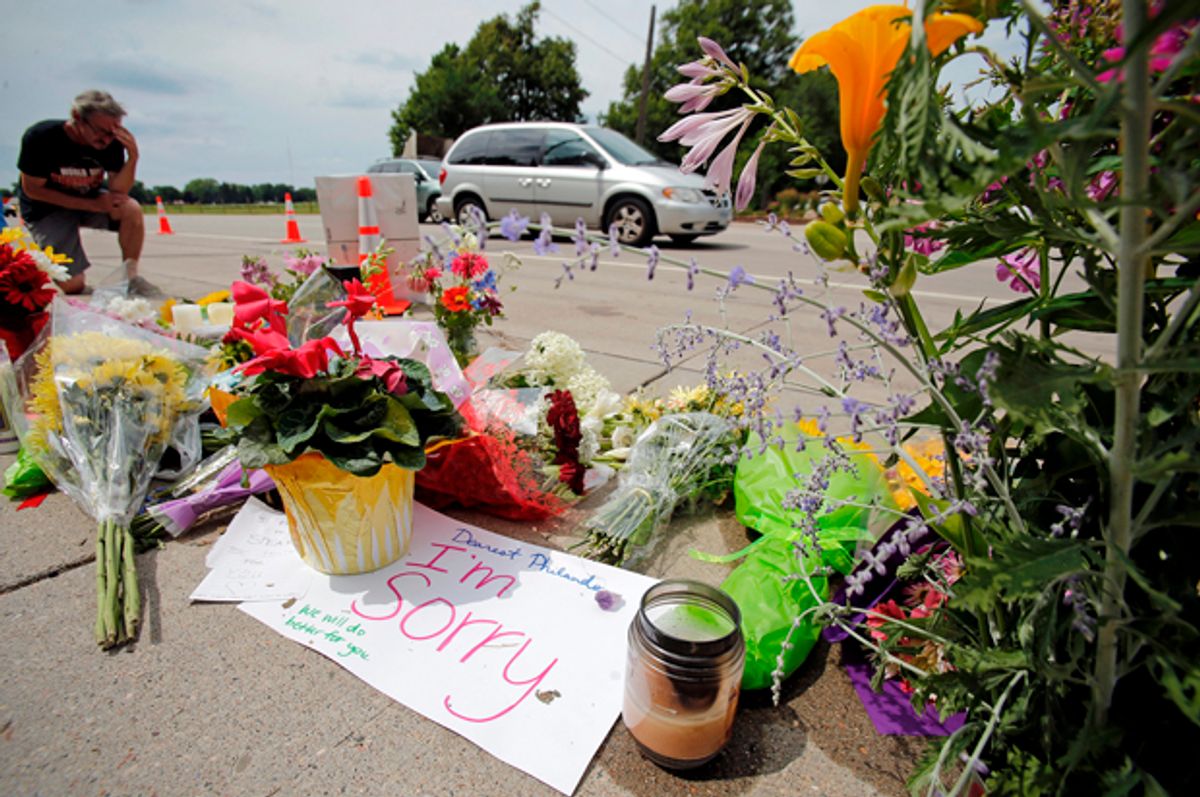On the afternoon of July 6, Duchess Harris, chair of the American Studies department at St. Paul’s Macalester College and co-author of the book "Black Lives Matter," brought a group of undergrads to see the exhibit “RACE: Are We So Different?” at the Science Museum of Minnesota.
Invited by new St. Paul Chief of Police Todd Axtell, Harris saw this as a positive sign of a "commitment to conscientious community engagement." Harris would wake up the next morning to find out that Philando Castile was killed by a police officer in Falcon Heights, a St. Paul suburb.
“When I woke up my heart was heavy with how challenging police brutality is,” Harris said.
Miski Noor — an organizer with the Minneapolis chapter of Black Lives Matter and a communication strategist with the national Black Lives Matter network — had a similar reaction.
“It’s the same cycle of feelings that you go through,” Noor said. “Shock, and then not shock, because every 21 hours a black man is killed by police or a vigilante in the United States. I feel sick to my stomach — sadness, anger, frustration. And after all of that, getting determined to continue the fight for liberation for black people and our collective liberation.”
Castile, 32, a food supervisor at a St. Paul Montessori school, was killed by police officer Jeronimo Yanez after a routine traffic stop. Yanez was accompanied by his partner, Joseph Kauser.
Castile is the second black man killed by a Twin Cities police officer in the past seven months.
Jamar Clark, 24, was shot by police on Nov. 15, 2015, after being detained by police outside a party in Minneapolis. On March 30, an investigation concluded that no charges would be filed against Mark Ringgenberg and Dustin Schwarze, the officers in the shooting.
Duchess Harris praised Minnesota politicians for their swift reaction to Castile’s death: “Although Minnesota can have its difficulties, I am extremely proud that my Congresswoman Betty McCollum, Gov. Mark Dayton, Lt. Governor Tina Smith, U.S. Senators Amy Klobuchar and Al Franken, and Rep. Keith Ellison sent a letter to U.S. Attorney General Loretta Lynch urging the U.S. Department of Justice to conduct a full and thorough investigation into the death of Philando Castile.”
Dayton has gone as far to say that Castile would still be alive if he and his passengers were white.
While politicians have called on the Department of Justice to investigate, the DOJ has deferred the case to the Minnesota Bureau of Criminal Investigation, offering help if needed.
Retired black St. Paul police officer Sgt. Melvin Carter, Jr., who served as a member of the SWAT team, a detective, and an internal affairs investigator during his 28-year career, said the shooting was “an overreaction to what was never a threat in the first place.”
Racism in policing is a national epidemic, said Carter, while conceding that “St. Paul does a better job than other folks.”
“Police work in itself is a hostile environment. It’s racist, sexist, violent. It’s inherent from the hand-me-down culture. White privilege is laced in the fiber of law enforcement," Carter said. “We’re at a place where we have to decide where we go from here. This last event [with Castile] was so obvious — we need reform.”
Noor agreed that race relations in the United States are at a crossroads.
“A lot is going to have to change," Noor said. "We’ve been pushing for change for a long time. And folks are actually going to have to look to community members and talk about community-based initiatives because obviously policing as-is is not working."
Noor said that there is a different kind of racism that pervades the Midwest.
“We have 'Minnesota Nice'; we have 'Midwest Nice,'" Noor said. "People think that things are better in the north or in the Midwest because people are more liberal and progressive. But racism takes a different form, and it’s harder to name, and it’s harder to see. But it shows up in the casual attitudes when folks all day can post about the Twins game or the State Fair, but not even say anything when [black] men have been killed by police.
Harris, Carter and Noor all agreed that changes to policing must come from within the community.
“We need peace officers, instead of law enforcement agents," Carter said. "Go back to community policing, where we originally came from. Get back to the true meaning of policing: hiring from the community, building relationships with the people who live in communities.”
“They say examinations of credit scores, family history, and where a person lives are subjective and often negatively impact black men," Harris said. "Should you be denied entry to the police academy for bad credit? I think we should blame the wealth gap and not the person that has fallen in the gap.”
Noor said the people who are most affected by policing should have a say on how police decisions are made.
“It’s not only about changes and reforming the police, we actually want the police abolished," Noor said. "We actually want a different system that is created by community, and created by the folks who are most marginalized and most harmed by police. People who are survivors of police violence, police rape. Folks that have been incarcerated, black trans women who have been targeted by the police, sex workers. Those folks should be making decisions about what our system should basically look like."
“This is not a way we can continue to live," Noor said. "It’s in our best interest to get out of a white supremacist, capitalistic patriarchy, which is what we’re living in."

Shares